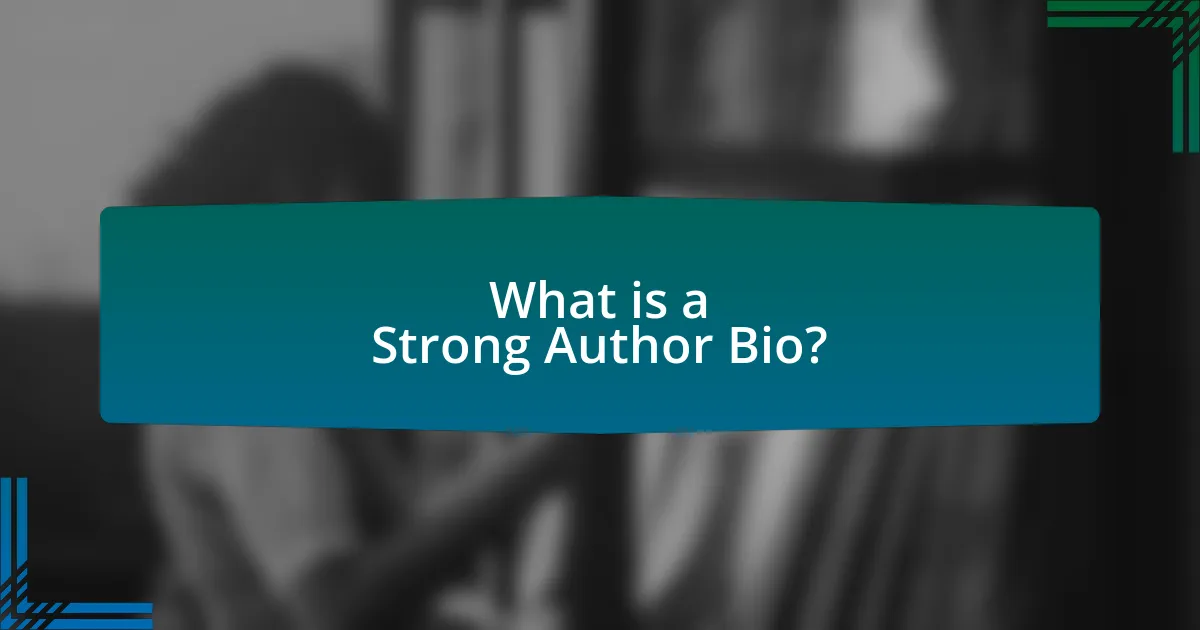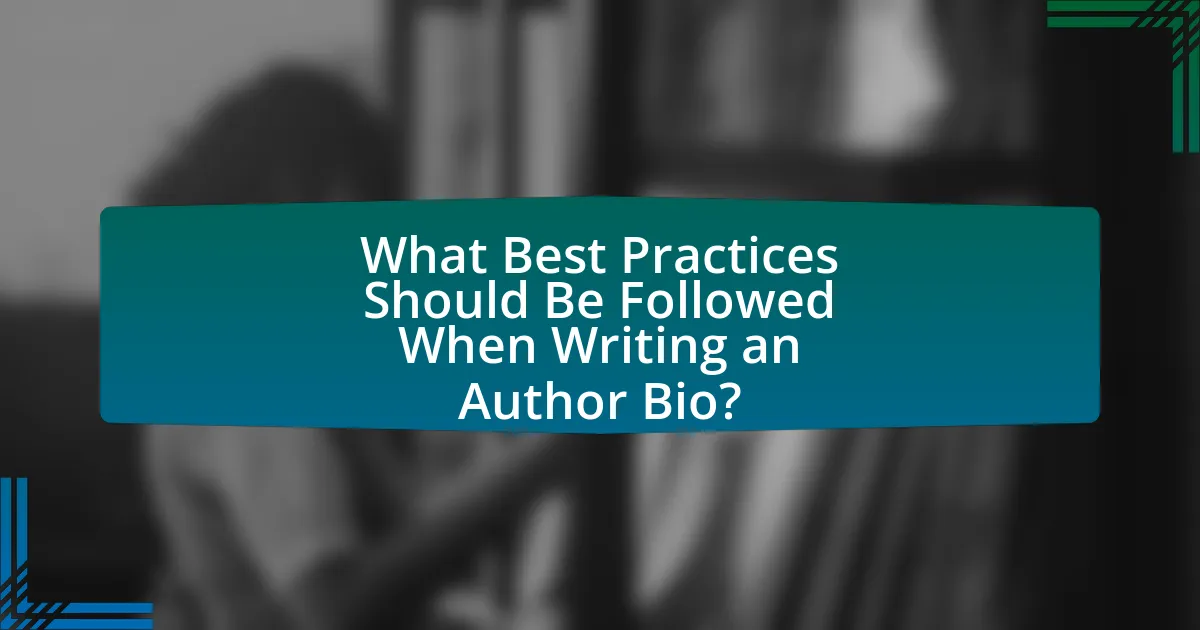Creating a strong author bio is essential for establishing credibility and connecting with readers. This article outlines the key elements of an effective author bio, including the importance of clarity, relevance, and authenticity. It discusses how to craft a compelling bio by highlighting professional achievements, personal interests, and writing credentials, while also addressing common pitfalls to avoid. Additionally, the article provides best practices for tailoring bios for different platforms and emphasizes the role of feedback and available resources in enhancing the quality of an author bio.

What is a Strong Author Bio?
A strong author bio is a concise and engaging summary that highlights an author’s credentials, expertise, and personality, effectively establishing their authority and connection with the audience. It typically includes relevant professional achievements, educational background, and personal interests that resonate with the target readership. For instance, a well-crafted author bio might mention published works, awards, or specific areas of expertise, which serve to build credibility and trust. According to a study by the Content Marketing Institute, 70% of consumers feel more connected to a brand when the content is created by a real person, underscoring the importance of authenticity in an author bio.
Why is an Author Bio Important for Writers?
An author bio is important for writers because it establishes credibility and connects them with their audience. A well-crafted bio provides essential information about the writer’s background, expertise, and achievements, which can enhance trust and interest among readers. For instance, a study by the Author’s Guild found that 70% of readers are more likely to purchase a book if they feel a personal connection to the author, highlighting the significance of a relatable and informative bio. Additionally, an effective author bio can improve visibility in search engines, as it often includes keywords related to the writer’s niche, further attracting potential readers.
How does an Author Bio impact reader perception?
An author bio significantly impacts reader perception by establishing credibility and trustworthiness. When readers encounter a well-crafted author bio, they are more likely to view the author as knowledgeable and authoritative in their field, which can enhance their engagement with the content. Research indicates that 70% of readers prefer to know about the author before engaging with the material, highlighting the importance of a strong bio in shaping initial impressions. Furthermore, a bio that includes relevant qualifications, experiences, and personal anecdotes can create a connection with the audience, making the content more relatable and appealing.
What role does an Author Bio play in marketing?
An Author Bio plays a crucial role in marketing by establishing credibility and connecting with the target audience. It serves as a personal introduction that highlights the author’s expertise, background, and unique perspective, which can enhance trust and engagement with potential readers. For instance, a well-crafted Author Bio can increase the likelihood of book sales or article readership by showcasing the author’s qualifications and experiences relevant to the subject matter. Research indicates that consumers are more likely to engage with content from authors they perceive as credible, underscoring the importance of a strong Author Bio in effective marketing strategies.
What are the Key Elements of an Effective Author Bio?
An effective author bio includes key elements such as a clear professional identity, relevant credentials, personal touch, and a call to action. A clear professional identity establishes who the author is and what they write about, while relevant credentials showcase expertise and build credibility. Adding a personal touch, such as hobbies or interests, helps readers connect with the author on a human level. Finally, a call to action encourages readers to engage further, whether by visiting a website or following on social media. These elements collectively enhance the author’s presence and appeal to potential readers.
What personal information should be included?
A strong author bio should include the author’s full name, professional title, relevant qualifications, and a brief overview of their writing experience. Including these elements establishes credibility and helps readers understand the author’s background. For instance, mentioning a degree in literature or years of experience in writing can enhance the bio’s impact. Additionally, including links to published works or notable achievements can further validate the author’s expertise and attract reader interest.
How can writing credentials enhance an Author Bio?
Writing credentials enhance an Author Bio by establishing credibility and authority in the subject matter. When authors include their relevant qualifications, such as degrees, professional experience, or published works, it signals to readers that they possess the expertise necessary to provide valuable insights. For instance, an author with a PhD in psychology writing about mental health will likely be perceived as more trustworthy than one without such credentials. This perception can lead to increased reader engagement and a stronger connection with the audience, ultimately enhancing the author’s reputation and influence in their field.

How to Craft a Compelling Author Bio?
To craft a compelling author bio, focus on clarity, relevance, and authenticity. Start with your name and a brief description of your professional background, highlighting your expertise and achievements in your field. Include specific details such as notable publications, awards, or relevant experiences that establish credibility. For instance, stating that you have published articles in recognized journals or have received industry awards can enhance your bio’s impact. Additionally, incorporate a personal touch by mentioning interests or motivations that resonate with your audience, making you relatable. This approach not only informs readers about your qualifications but also engages them on a personal level, increasing the likelihood of connection and interest in your work.
What Writing Style Works Best for an Author Bio?
The best writing style for an author bio is concise and engaging. This style effectively captures the reader’s attention while providing essential information about the author. A well-crafted author bio typically includes a brief overview of the author’s background, notable achievements, and writing focus, all presented in a clear and approachable tone. Research indicates that readers prefer bios that are straightforward and relatable, as they foster a connection with the author. For instance, a study by the Content Marketing Institute found that 70% of consumers feel more connected to a brand when the content is authentic and personal, underscoring the importance of a genuine writing style in author bios.
How can tone and voice reflect an author’s personality?
Tone and voice can reflect an author’s personality by conveying their unique style, emotions, and perspectives through word choice and sentence structure. For instance, an author who uses humor and informal language may project a playful and approachable personality, while one who employs formal language and complex sentence structures may appear more serious and intellectual. Research indicates that readers often perceive an author’s personality traits based on the tone and voice in their writing, influencing their connection to the text and the author. This connection can enhance the author’s brand and relatability, making it essential for creating a strong author bio.
What are the common pitfalls to avoid in writing style?
Common pitfalls to avoid in writing style include excessive jargon, lack of clarity, and inconsistent tone. Excessive jargon can alienate readers who may not be familiar with specialized terms, making the content less accessible. Lack of clarity often results from convoluted sentence structures or vague language, which can confuse the audience and obscure the main message. Inconsistent tone can disrupt the flow of the writing and create a disjointed reading experience, leading to a loss of reader engagement. These pitfalls can diminish the effectiveness of an author bio, which should be clear, engaging, and reflective of the author’s voice.
How Long Should an Author Bio Be?
An author bio should typically be between 100 to 200 words. This length allows authors to provide essential information about their background, expertise, and notable achievements without overwhelming the reader. Research indicates that concise bios are more effective in engaging audiences, as they deliver key points quickly and maintain interest. For instance, a study by the Content Marketing Institute found that shorter bios are more likely to be read in full, enhancing the author’s visibility and connection with the audience.
What are the guidelines for short vs. long bios?
Short bios should be concise, typically around 50-100 words, focusing on key achievements and relevant information, while long bios can range from 150-300 words, allowing for more detailed storytelling and background. The short bio is ideal for social media profiles or bylines, where space is limited, and it should highlight essential credentials and expertise. In contrast, the long bio provides an opportunity to elaborate on personal experiences, professional journey, and unique insights, making it suitable for author pages or personal websites. This distinction is supported by best practices in content creation, which emphasize clarity and engagement based on the platform’s requirements.
How can brevity enhance clarity in an Author Bio?
Brevity enhances clarity in an Author Bio by allowing essential information to be communicated quickly and effectively. A concise bio eliminates unnecessary details, making it easier for readers to grasp the author’s qualifications and expertise at a glance. Research indicates that readers often skim content, and a succinct bio caters to this behavior by presenting key points without overwhelming the audience. For instance, a study by Nielsen Norman Group found that users typically read only 20% of the text on a webpage, highlighting the importance of brevity in capturing attention and conveying critical information efficiently.

What Best Practices Should Be Followed When Writing an Author Bio?
When writing an author bio, best practices include being concise, highlighting relevant credentials, and showcasing personality. A concise bio typically ranges from 50 to 150 words, ensuring that readers quickly grasp the author’s expertise and background. Highlighting relevant credentials, such as degrees, publications, or professional experience, establishes credibility and authority in the subject matter. Showcasing personality through a unique writing style or personal anecdotes can engage readers and make the author more relatable. According to a study by the Content Marketing Institute, bios that include personal elements can increase reader connection and engagement by up to 30%.
How to Tailor an Author Bio for Different Platforms?
To tailor an author bio for different platforms, authors should adjust the tone, length, and content to fit the audience and purpose of each platform. For instance, a professional networking site like LinkedIn requires a formal tone and a focus on career achievements, while a personal blog may benefit from a more casual and relatable style that highlights personal interests and storytelling. Additionally, social media bios should be concise, often limited to character counts, and may include hashtags or emojis to enhance engagement. This approach ensures that the bio resonates with the specific audience of each platform, increasing the likelihood of connection and engagement.
What adjustments should be made for social media bios?
Social media bios should be concise, engaging, and tailored to the platform’s audience. A bio should typically include key information such as the individual’s profession, interests, and a unique personal touch to foster connection. For instance, Twitter bios are limited to 160 characters, necessitating brevity and clarity, while Instagram allows for more creativity and personal expression. Research indicates that bios with a clear call-to-action or links to personal websites can increase engagement by up to 30%. Therefore, adjusting social media bios to fit character limits, audience expectations, and including actionable elements can significantly enhance their effectiveness.
How can an Author Bio be optimized for a personal website?
An Author Bio can be optimized for a personal website by ensuring it is concise, engaging, and includes relevant keywords. A well-structured bio should start with the author’s name and a brief introduction that highlights their expertise and achievements. Including specific accomplishments, such as published works or awards, adds credibility. Additionally, incorporating keywords related to the author’s niche improves search engine visibility, making it easier for potential readers to find the bio. Research indicates that bios with clear, targeted information can increase reader engagement by up to 30%, demonstrating the importance of optimization for attracting an audience.
What Common Mistakes Should Be Avoided in an Author Bio?
Common mistakes to avoid in an author bio include being overly vague, using jargon, and failing to highlight relevant achievements. Vague descriptions do not provide readers with a clear understanding of the author’s expertise or background, which can diminish credibility. The use of jargon can alienate readers who may not be familiar with specific terms, making the bio less accessible. Additionally, neglecting to mention significant accomplishments or relevant experiences can result in a missed opportunity to establish authority in the field. These mistakes can ultimately weaken the impact of the author bio and reduce engagement with the audience.
How can clichés undermine the effectiveness of an Author Bio?
Clichés can undermine the effectiveness of an Author Bio by making it sound generic and unoriginal, which fails to engage readers. When an author relies on overused phrases, it diminishes their unique voice and personal brand, leading to a lack of connection with the audience. Research indicates that originality in writing significantly enhances reader interest and retention, as demonstrated in studies on consumer behavior that show unique content is more memorable and persuasive. Therefore, avoiding clichés is essential for creating a compelling Author Bio that resonates with readers.
What are the risks of being overly self-promotional?
Being overly self-promotional can lead to reputational damage and alienation of potential audiences. When individuals excessively highlight their achievements or capabilities, they risk being perceived as insincere or egotistical, which can diminish trust and credibility. Research indicates that 70% of consumers prefer brands that are authentic and relatable, suggesting that excessive self-promotion can backfire by creating a disconnect with the audience. Additionally, self-promotion can overshadow the value of the content being shared, leading to decreased engagement and interest.
What Tips Can Help Create a Strong Author Bio?
To create a strong author bio, focus on clarity, relevance, and personality. A clear bio should succinctly convey your professional background, including your expertise and accomplishments, while remaining relevant to your audience and the context in which your bio will appear. Incorporating a personal touch, such as your interests or motivations, can help readers connect with you on a human level. For example, a study by the Content Marketing Institute found that personal stories in bios can increase reader engagement by up to 50%. Additionally, using a professional tone and including links to your work or social media can enhance credibility and accessibility.
How can feedback from peers improve an Author Bio?
Feedback from peers can significantly enhance an Author Bio by providing diverse perspectives that highlight strengths and identify weaknesses. Peers can offer insights into how the bio resonates with the intended audience, ensuring that the language and tone are appropriate. Additionally, constructive criticism can reveal overlooked achievements or skills that should be included, making the bio more comprehensive and appealing. Research indicates that peer feedback fosters collaboration and improves content quality, as seen in studies on writing effectiveness, such as those published in the Journal of Writing Research.
What resources are available for writing a compelling Author Bio?
Resources available for writing a compelling Author Bio include online guides, writing workshops, and professional services. Online platforms like Reedsy and Writer’s Digest offer comprehensive articles and templates specifically designed for crafting author bios. Writing workshops, often hosted by literary organizations or community colleges, provide personalized feedback and tips from experienced authors. Additionally, professional services such as freelance editors or writing coaches can assist in refining an author bio to ensure it effectively highlights achievements and engages readers. These resources collectively enhance the quality and impact of an author bio, making it more compelling and tailored to the target audience.



